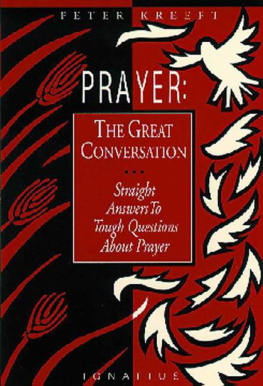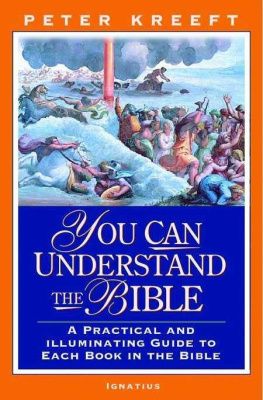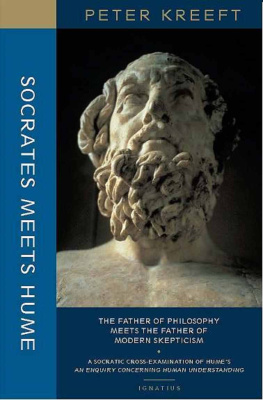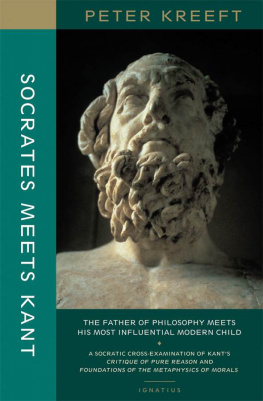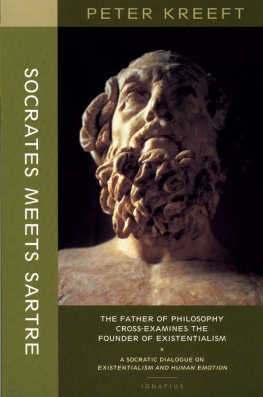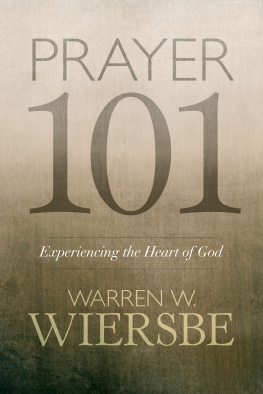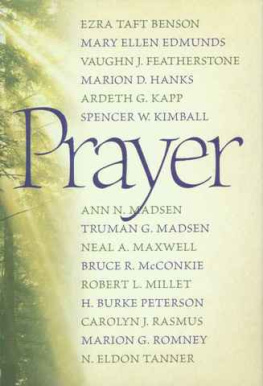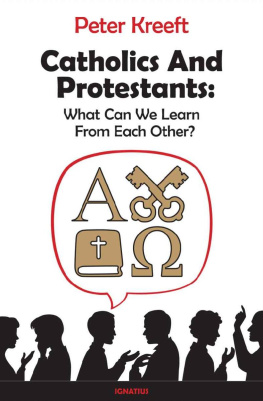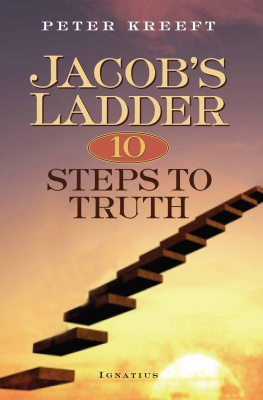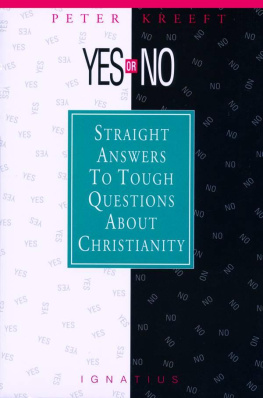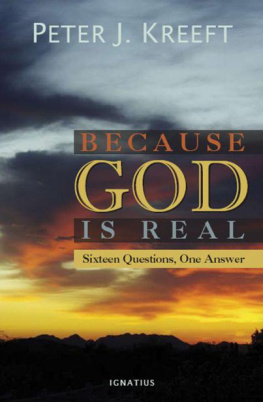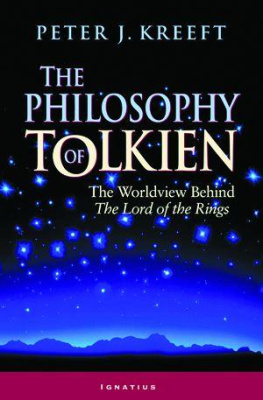PRAYER:
THE GREAT CONVERSATION
Prayer :
The Great Conversation
Straight Answers to Tough Questions about Prayer
by
Peter Kreeft
IGNATIUS PRESS SAN FRANCISCO
Originally published by
Servant Publications
Ann Arbor, Michigan
Cover by Kelly Connelly
Published 1991, Ignatius Press, San Francisco
1985 Peter Kreeft
All rights reserved
ISBN 978-0-89870-357-3
Library of Congress catalogue card number 91-75444
Printed in the United States of America
Contents
for Tom DiLorenzo, Gregory Elmer,
and Ronda Chervin
Preface
THIS BOOK CAN BE USED by itself or as part of a catechism, of which Yes or No ? was the first volume. Yes or No ? explored apologetics, reasons for the Christian faith: the objective half. This book explores prayer and the spiritual life: the subjective half. Future volumes will deal with morality and Church.
This catechism is unique for (1) its dialogue form, (2) its ecumenical, mere Christianity content, and (3) its orthodox, traditional point of view. Most catechisms are (1) monologue, and therefore sound preachy, (2) either for Protestants only or for Catholics only, and (3) more often than not written from the point of view of some form of Christianity-and-water, as C. S. Lewis calls the various current attempts to water down the full Gospel, the strong meat the Church has believed from the beginning.
The dialogue form seems to fit the subject matter, for prayer itself is a dialogue, a great conversation with God. In Yes or No ? the dialogue partners were a believer (Chris the Christian) and an unbeliever (Sal the Seeker). Now Sal has become a new Christian, and Chris pastors Sal in the area of prayer. (Note that Sal can stand for Sally or Salvatore, and Chris for Christopher or Christine.)
The ecumenical content is not a thin lowest common denominator, but the beef, essential Christianity. What Protestants and Catholics agree about is incomparably more important than what they disagree about.
The fact that the point of view is traditional does not mean it is dead or boringunless C. S. Lewis, G. K. Chesterton, Thomas Merton, John Wesley, Kierkegaard, Newman, Pascal, Luther, Aquinas, Augustine, Paul, and Jesus himself are dead and boring.
Yes or No ? was dramatic. It sought the truth with a passion. This book has an even greater drama and passion: not just for the truth about God but for God himself. Prayer is the most exciting experience in human life when it is done correctly, for prayer means touching God.
Dialogue One
Praying Isnt
Saying Your
Prayers
Chris : Well, here we are again in another book!
Sal : The last one worked out all right. Maybe this one will too. Whats this one about?
Chris : About the practice of the religion youve come to believe in. Your next step.
Sal : Practice? You mean ethics? Morals?
Chris : No, that part will come in another book.
Sal : Going to church, then? Public worship?
Chris : No, though thats part of it toostill another book.
[Three parts of religion]
Sal : But I thought those three were the three parts of religion: what you believe, how you live, and what you do in church: words, works, and worship; creed, code, and cult.
Chris : Thats pretty good. But theyre the shell, not the nut; the car, not the engine; the bread, not the meat.
Sal : Well, whats the meat? Wheres the beef?
Chris : A pretty important question, wouldnt you say?
Sal : And your pretty important answer is?
[The essence of Christianity]
Chris : The essence of Christianity is a lived relationship with God, a love affair with God. Its more like marriage than anything else I can think of: a whole shared life. Those other three things we mentionedshared ideas, shared values, and shared activitiestheyre only aspects of that shared life.
Sal : Let me get this straight. We talked about theology and doctrine last time, right? What you believe and why you believe it.
Chris : Right.
Sal : And now youre telling me that this isnt the heart of it all?
Chris : Right. Theology is knowing truth about God. Thats important, all right, but not as important as knowing God; just as knowing things about your friend is not as important as knowing your friend.
Sal : I see. Christianity isnt just an idea; its a relationship.
Chris : Exactly.
Sal : Then where do the ideas come in? The doctrines Ive learned to believehow do they relate to this relationship?
Chris : Theyre the shape of it, the skeleton. But a skeleton without living flesh is pretty uglyand dead.
Sal : I see. But flesh without a skeleton cant live either.
Chris : Right you are! Christianity is both. We talked about the intellectual skeleton in our last set of conversations; now were here to talk about the flesh, the experience of touching God.
Sal : That sounds exciting. I suppose you have a dull name for it?
Chris : Yes, as a matter of fact. Sometimes its called prayer, sometimes spirituality, sometimes the inner life.
[Is prayer exciting?]
Sal : The word prayer doesnt sound exciting; but the experience of meeting Godreally experiencing him, not just having concepts about himthat sure sounds exciting.
Chris : Its the most exciting thing in the world, though in a deep and peaceful sort of way. No one who has ever experienced God in prayer has ever found anything more joyful, not even owning half the world.
Sal : Dont you think most people would laugh at that claim?
Chris : Only the ones who havent tried both, and theyre in no position to compare them then. Experience is the surest teacher.
Sal : But havent most people tried it? Doesnt almost everyone pray sometimes? Yet they dont seem to get much of a kick out of it.
Chris : Most people dabble in it. They say a few prayers. But thats like getting only your toes wet in the ocean and then thinking you know what an ocean swim is. Real prayer is like jumping in over your head and letting the waves break over you, even letting the undertow carry you out to sea.
Sal : Sounds scary,
[God is love]
Chris : Thats why people avoid it. It sounds scary, but God is love . it isnt, because the ocean is God, and God is love.
Sal : Love can seem scary sometimes, you know.
Chris : Youre profoundly right there.
Sal : Love can be like fire.
Chris : Ah, but Gods love is the opposite of fire in one way: the closer you get to it, the less youre burned. It seems painful and scary only at the outer edges.
Sal : Also, fire doesnt care about you.
Chris : Right again. And God does. In fact, right this minute hes longing to have you come closer to him.
Sal : You mean literally?
Chris : Yes.
Sal : But I thought God was eternal and perfect and had no needs.
Chris : Yes, but hes a person, not just a force. He has a will, a heart, a desire. Hes love , Sal! And love is longing, yearning. What meaning could we possibly give to God is love if that love were cold and correct and uncaring and calculating? Love always cares. And since God is infinite love, his caring and desiring and yearning are infinite.
Sal : Wow! Its hard to square that with my picture of God being eternal.
Chris : Yes, it is. But dont let either truth go, just because you cant understand how they fit together.
Sal : What does God yearn for, then?
Chris : The one thing he cant do himself, the one thing he cant give to himself and only you can give him.
Sal : Is there such a thing?
Chris : Yes.
Sal : What is it, then?
Chris : Your free love, your free choice to come closer to him, your yes to his offer of intimacy. What we just talked about.
Sal : You mean God wants me to learn how to pray?
Next page
